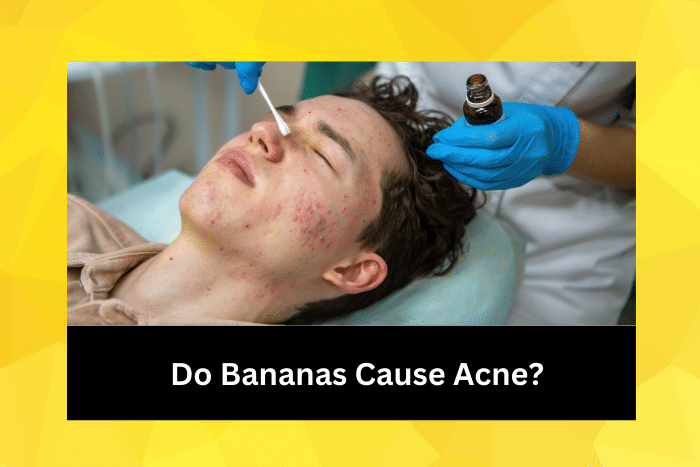It’s a question I see asked fairly often, do bananas cause acne?
I’m sure you’ve come to realize that certain foods typically cause breakouts in your skin.
More often than not, this will be due to you consuming baked, fried, or greasy foods.
However, you may even have noticed the odd pimple even when you feel you’re eating a healthy diet.
This begs the question of whether certain foods that you consider are good for you may actually induce acne.
So, allow me to explain the potential relationship between bananas and acne.
Bananas themselves don’t cause acne. In fact, bananas contain various anti-inflammatory properties that are known to help skin prone to acne. With that being said, the more ripe a banana is, the more sugar and insulin-like growth factor 1 (IGF-1) it will contain. These ingredients are known to trigger the skin’s natural oil, sebum, which is typically associated with acne. Therefore, if you’re worried about an acne breakout, then stick to green bananas or simply eat half a ripe banana.
1. Could Ripe Bananas Cause Acne?
Firstly, I think it’s important to say that eating bananas shouldn’t cause acne in most people.
However, in terms of nutrients and digestion, there’s a huge difference between ripe and unripe bananas.
Bananas are basically all carbohydrates.
Whether ripe or unripe, a banana contains no fat and just a tiny amount of protein (literally 1g of protein in a medium-sized banana).
With that being said, not all carbs were created equal.
One of the best things about bananas in terms of digestion is that they contain fiber.
However, the less ripe a banana, the more fiber it contains.
Additionally, when a banana is still green and unripe most of the carbs are slow-release starchy carbs.
But, as a banana ripens, it loses some of the fiber, plus the starchy carbs start to convert to sugar.
And just in case you weren’t aware, sugar consumption is one of the leading causes of acne in most people.
So, you may view fried, greasy, baked, and fatty foods as the devil incarnate, especially in terms of the breakouts they cause.
However, sugar is just as much a culprit.
Furthermore, the starchy carbs not only convert to sugar as a banana ripens, but they also produce insulin-like growth factor-1 (IGF-1).
Both sugar and IGF-1 are known to trigger the production of sebum.
This is the natural oil you typically feel on your skin, and of which excess leads to acne.
So, in effect, the sweeter, mushier, and riper a banana, the more likely it will be to trigger acne in certain individuals.
The moral of the story – if you are worried about eating bananas and getting acne, then go green.
The less ripe a banana, the lower the likelihood of you having an outbreak of pimples.
2. Should You Limit Your Banana Intake If You’re Worried About Acne?
Something else to consider, especially if you’re someone who’s prone to acne, is your overall banana consumption.
We[‘ve established that the riper a banana is, the more sugar it contains.
And unfortunately, not only does sugar trigger sebum production, but it also spikes your blood sugar levels.
This reaction inside the body is often enough for someone to experience a breakout of spots.
However, if you can keep your sugar consumption to below 15g with any snack or meal, it won’t actually have such an effect on blood sugar.
In fact, keeping your sugar consumption this low should help to avoid spikes in blood sugar, as well as sebum production, which of course, is good news for your pimples.
So, if you are someone who suffers from acne, then I’d suggest sticking to no more than half a fully ripe banana a day.
Of course, the greener a banana, the less you’ll have to worry about this.

3. What About Banana Face Masks?
I’ve already mentioned that bananas contain certain anti-inflammatory properties, which can actually help fight acne.
So, I didn’t want to leave you thinking that bananas are all bad when it comes to acne.
In fact, the fiber and potassium found in bananas will help to fight against many serious illnesses and diseases.
Furthermore, bananas contain Vitamins B6 and C, as well as silica.
All of these nutrients are actually great for your skin.
This is actually why you’ll find that banana face masks are often heralded as fantastic anti-acne treatments.
The presence of silica in bananas and banana face masks will help to increase the production of collagen.
And collagen is a chemical known for making the skin soft and smooth.
So, whereas ripe bananas (when consumed) may contain certain ingredients that can cause acne, the same cannot be said for banana face masks.
Therefore, banana face masks will definitely help to fight acne.
And eating green bananas, or half or less of a ripe banana, will not trigger acne.
Dry Banana Face Mask Miracle
Final Thoughts
So, I hope you understand that bananas themselves don’t actually cause acne.
However, ripe bananas will contain more sugar and IGF-1 than their unripe counterparts.
And both of these ingredients can lead to increased sebum production, which causes oily skin.
So, if you are someone who is prone to acne, then eating either green bananas or a minimal amount of ripe bananas is best.
With that being said, bananas do contain a wealth of healthy ingredients, many of which can actually help to fight acne.
However, these ingredients are typically best applied to the face via the use of a banana face mask.
After reading this, you might be wondering just how many bananas you can eat without any ill effects.
